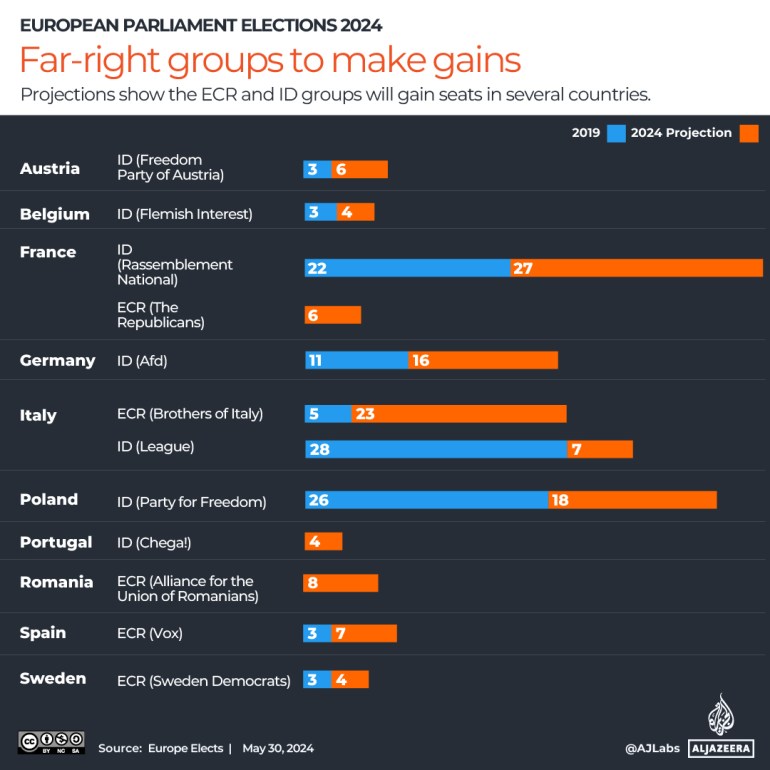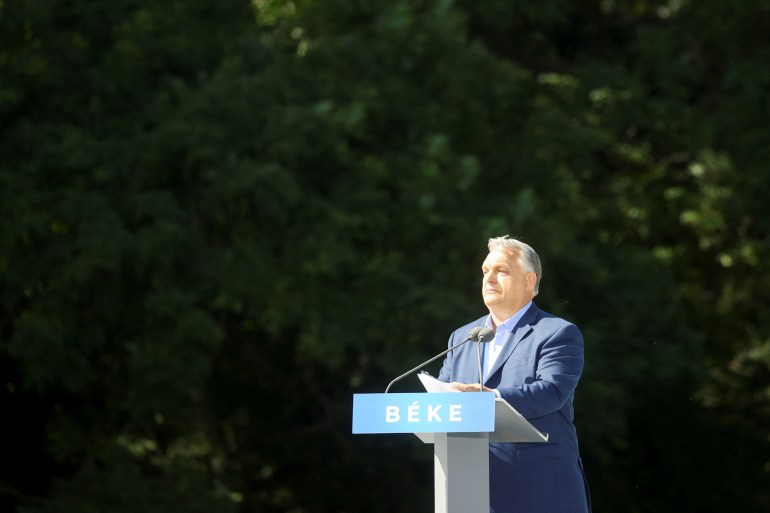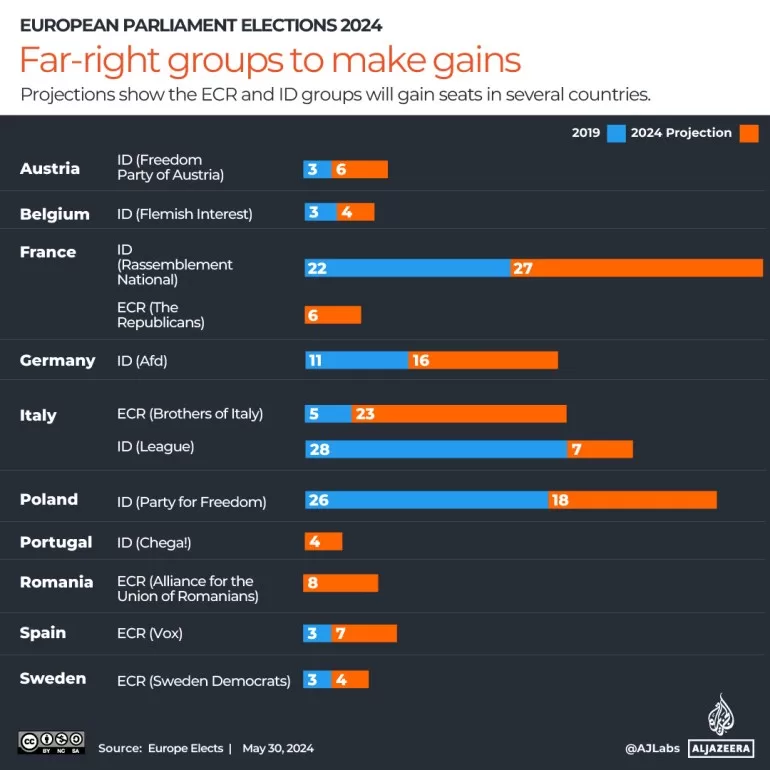A week later, it froze the assets of one of those outlets, Voice of Europe, and sanctioned its owner, Viktor Medvedchuk, a former Ukrainian lawmaker who now resides in Russia.
The Czech Republic, where Voice of Europe is based, had sanctioned Medvedchuk and Voice of Europe last March. Soon after, Belgian Prime Minister Alexander De Croo claimed Russia was paying the members of the European Parliament (MEPs) to spread propaganda in Europe.
These moves were the latest by the European Union to defend its information space from alleged Russian influence ahead of European Parliament elections on Thursday and Friday, during which right-wing parties that enjoy warm relations with Moscow are anticipated to make significant gains.
The European Council on Foreign Relations (ECFR), a think tank, in January forecast that far-right parties would outpoll mainstream parties in nine out of 27 EU member states, and form the third-biggest bloc in the European Parliament after the centre-right European Popular Party (EPP) and the centre-left Social Democratic Party (SDP).
That bloc, Identity and Democracy (ID), comprises the most hardline parties, like Freedom of Austria and Italy’s Northern League.
Other conservatives who self-identify to the right of the EPP, such as Brothers of Italy and Poland’s Law and Justice (PiS), belong to the European Conservatives and Reformists (ECR). Others still are unaligned. If they were all to join forces after June 9, the ECFR believes they would command 225 seats in the 720-seat chamber, becoming the biggest bloc.
‘The Russians are paying attention to these elections’
Russia officially denies meddling in Western elections, but analysts are convinced otherwise.
Moscow is trying to aid the progress of hardliners with what Maxim Alyukov, a research fellow at Manchester University’s Department of Russian and East European Studies, calls “pragmatic manipulation”.
“These far-right parties are seen [by Moscow] as allies because they in general are seen as centrifugal forces which can erode cohesion in the EU, making it easier for Russia to establish its own hegemony,” he told Al Jazeera.
To influence the European vote, Alyukov suggested Moscow has been plying narratives already tested on the Russian electorate.
For example, amid its war in Ukraine, Russia has ramped up its messaging against gay rights propagated by Western liberal democracies, and in favour of traditional family values.
“At a certain point, [the Kremlin] just found it to be a very effective strategy to divide people in Russia … and weaponise this implicit homophobia which was there in Russia but wasn’t a political instrument,” said Alyukov.
The vehicles for this and other narratives have been Russian news outlets, like Rossiyskaya Gazeta, RIA Novosti and Izvestia, which the European Commission took off the airwaves in May. But there have also been outfits such as Voice of Europe, which are not based in Russia and sport a mainstream appearance.
Other information operations carried similar European-sounding names like Euro-More, France et EU, and Recent and Reliable News, said Stephen Hutchings and Vera Tolz-Zilitinkevic, professors of Russian studies at Manchester University and lead investigators in the (Mis)Translating Deceit project, which tracks covert Russian news operations.
“All these outlets appeared in the context of the banning of Russia Today and Sputnik [in March 2022] as alternatives,” Tolz-Zilitinkevic told Al Jazeera.
“[With] RT and Sputnik, it was very clear [they] were state-funded outlets with content that was sometimes disinformation in the strictest sense – fabricated material,” she said. “But these sites … their provenance is much less clear, and clearly their creation is part of the strategy which is organised by various actors in Russia including intelligence services.”
Some of these operations were easy to detect, said Hutchings, because they used auto-translations from original Russian articles, or cited Russian media as sources.
“My sense is [the Russians] are paying attention to these elections and they do see an opportunity here in a success of the far right,” Hutchings told Al Jazeera.
Their focus, he said, was “any stories that present the EU in a bad light”.
In liberal member states, for example, “they might emphasise minorities being underrepresented in the EU Parliament”, said Hutchings. “But elsewhere, such as Poland and Hungary, they will go with the antiliberal, anti-woke narratives that appeal to those populations.”
Perhaps the most aggressively pursued narrative is the argument that sanctions are an own goal for Europe, because they raise energy costs and living costs.
That ties in with a sister narrative that “major international institutions are dominated by elites from the Western liberal establishment and basically they apply the law any way they want”, said Alyukov.
Russia justifies spun reporting through similar relativism, he said.
“[The Russians] understand that all reporting is subjective, so it’s political, and if you live in Russia you have to defend Russia’s interests.”
There is a military purpose to exploiting political divides in Western society, said Jade McGlynn, a researcher in the War Studies Department at King’s College London.
“If we look at where their messaging is focused, particularly regarding elites, it suggests that what they’re most worried about is a re-entrenchment of Western support for Ukraine, and the West really giving Ukraine free rein to fight,” she told Al Jazeera.
The Kremlin has been counting on Western self-restraint, propagated by conservatives who have amplified Russian arguments that the West provoked the Russian invasion and that its persistent defence of Ukraine will lead to nuclear war.
That effort has been failing.
Last April, the United States Congress approved a $60bn spending bill for Ukraine over Republican objections, and last week, the United Kingdom, France, Germany and the US gave Ukraine permission to use their weapons to strike on Russian soil, enraging the Kremlin.
European elections present a new opportunity, McGlynn told Al Jazeera.
“I think, the Russians are making a good bet that the West will lose interest in helping Ukraine before Russia loses interest in destroying it.”
Pro-Russian narratives take hold
These narratives have played especially well in landlocked Central European countries stretching across the former Austro-Hungarian Empire from the Carpathians to the Alps, either because they have large Russophilic populations or because they have a vested interest in buying piped oil and gas from Russia.
All of them successfully argued for derogations from an EU ban on Russian oil imports, which took effect in December 2022, and while many other EU states did the same, those seen as geographically vulnerable to Russian supplies won the longest exceptions.
The 2008 global financial crisis and the 2015 refugee crisis gave far-right parties in this region a huge lift, said Daniela Richterova, a senior lecturer in Intelligence Studies at the War Studies Department at King’s College London, who specialises in the former Czechoslovakia.
“Especially the more working-class voters were disillusioned with what they saw as the EU’s inability to help improve their economic conditions,” Richterova told Al Jazeera. “The EU’s handling of the migration crisis … also made some voters sceptical about the pros and cons of being in the Schengen zone and having open borders.”

Here and elsewhere in Europe, authoritarian, anti-immigrant, anti-globalist, Eurosceptic, populist parties have since flourished.
Fidesz has ruled in Hungary since 2010 and the PiS party ruled Poland from 2015 to October 2023, partly thanks to a shared playbook of suppression of free speech and judicial subversion.
The Party for Freedom became the third-largest in the Netherlands in the 2010 parliamentary election, rose to second place in 2017 and came first in November 2023. Its controversial leader, Geert Wilders, now dominates a coalition formed last month.
The Alternative for Germany (AfD) won seats in a series of state legislatures beginning in 2014 and took 12.6 percent of the vote to enter the federal parliament in 2017.
In Finland, the Finns Party, formerly known as the True Finns, took 17.7 percent of the vote in 2015 and ruled as coalition partners for two years. The Sweden Democrats became the country’s second-largest party in 2022. A right-wing coalition came to power in Italy that year. In France, the National Front has been steadily increasing its vote share in the past three presidential elections.
But the far right in Austria predates them all.
Under Jorg Haider, the Freedom Party of Austria (FPO) placed second in the 1999 general election unaided by global crises, and entered a coalition with the centre-right Austrian People’s Party, which had placed third.
It was the first entry of a hardline party in government since the second World War and it shocked Europe.
The FPO now outpolls everyone else at 29 percent on the basis of a platform that is friendly towards Russia, including continuing to import almost all of Austria’s oil and gas from Russia.
That is because Austrian ultraconservatism and Russophilia cross party lines, said Velina Tchakarova, an independent geopolitical and risk consultant based in Vienna.
“The [mainstream] conservatives were in power in 2018 when the state contract for delivery of Russian gas was signed. It runs to 2040 and nobody can tell you its contents,” she told Al Jazeera. “There is no publicity, no transparency. Opposition forces tried to have a debate on it – they didn’t get it.”
Conservatives are now bleeding voters to the FPO, Tchakarova believes.
“Conservatives won 37 percent in the last election, and are polling at 21-23 percent, so that tells you where this difference is going.”
So powerful are the forces protecting Russian gas that the decennial process of drafting a new security strategy – in which Tchakarova was involved – foundered last year when the conservatives insisted on not diversifying from Russian gas.
She said, “Now we still have a security strategy that goes back to 2013, before the first Russian invasion [of Ukraine], and in this document, Russia is a strategic partner.”
The FPO signed another secret agreement with Moscow in December 2016 – this time with the United Russia Party that supports President Vladimir Putin. It is a boilerplate agreement, also contracted a few months later between United Russia and the Northern League, a far-right party in neighbouring Italy.
Danilo Procaccianti, lead reporter on the state RAI network’s show Report, obtained both of those agreements, which he shared with Al Jazeera.
They call for experience-sharing in “party building, organisational work, youth policy, economic development … legislative activity”, and suggest United Russia wanted to learn about the workings of two major European democracies.
When Procaccianti interviewed Northern League leader Matteo Salvini after Russia’s full-scale invasion of Ukraine in February 2022, he downplayed the agreement.
“They backed down because, especially at the beginning of the war, it was very inappropriate to appear close to Putin,” Procaccianti told Al Jazeera.
In the invasion year, the League’s share of the popular vote also fell to 8.79 percent from 17.35 percent in 2018, but Procaccianti does not believe voters punished Salvini for his pro-Russia views.
“I do not believe that this influenced the electoral results,” said Procaccianti, “because Italians pay little attention to foreign policy … Salvini has lost consensus because [Prime Minister Giorgia] Meloni has dried up his electoral base – they are fishing in the same sea.”
For Dimitar Bechev, a lecturer at the Oxford School of Global and Area Studies (OSGA) and senior fellow at Carnegie Europe, the question is whether mainstream conservatives will embrace the right.
“The big question, to my mind, is whether the EPP – the likely winner overall – will recreate the coalition with Social Democrats,” Bechev told Al Jazeera, “or rather turn to the conservative ECR [Meloni, Orban, Poland’s PiS]. A centre right-far right realignment will be an important inflexion point.”
